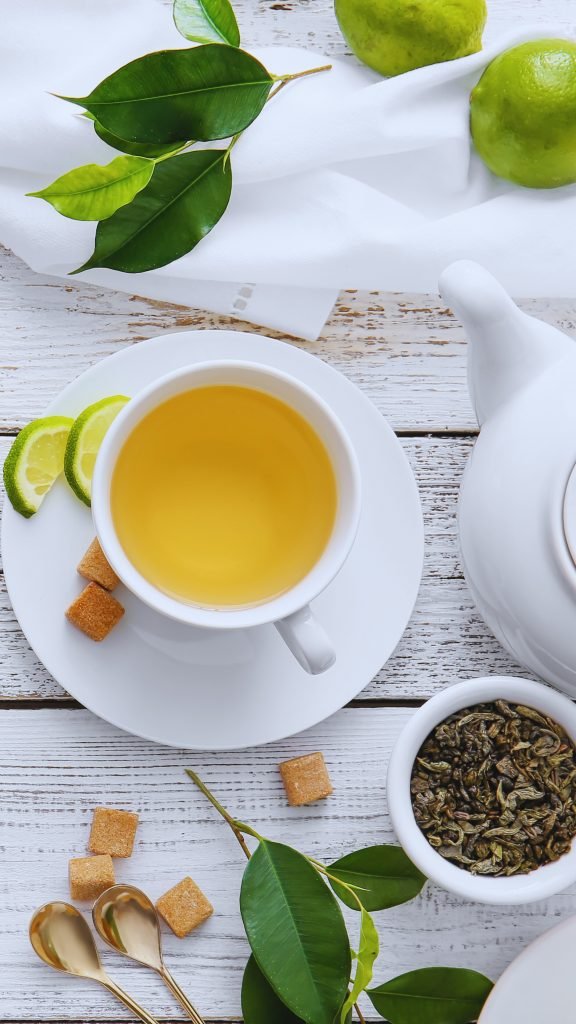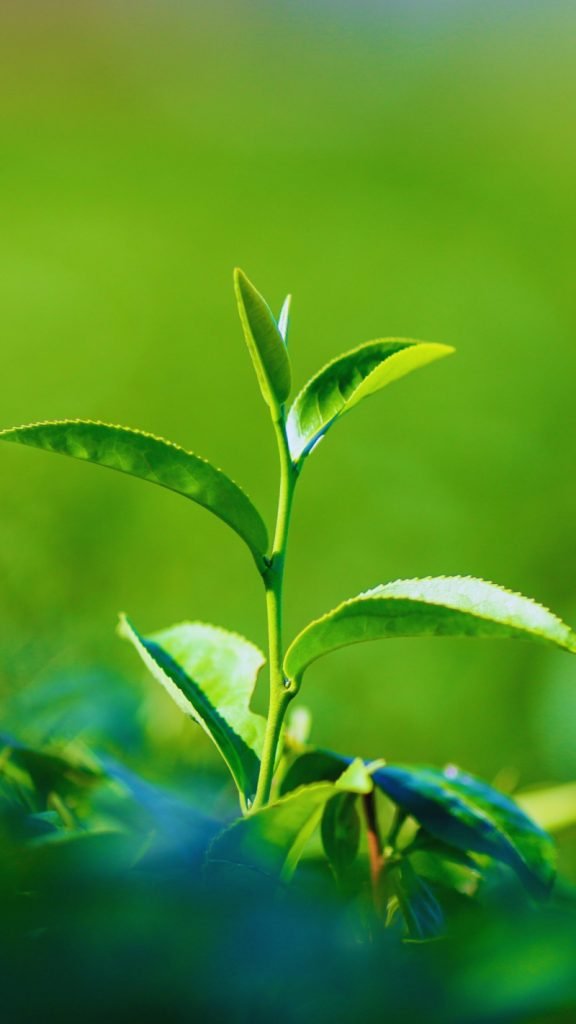
What is green tea?
Green tea is a Chinese tea that is made from the leaves and buds of the Camellia sinensis plant. It is a very popular beverage or dietary supplement, consumed popularly for its awesome health benefits, with weight loss being the chief of them all (1).
It is not fermented like black tea and oolong tea, as such it is not oxidized (exposed to air to get dry and dark in color). Rather, after the leaves are harvested, they are quickly dried or steamed, heated, rolled up into various shapes, dried and finally packaged for sale (1).

Different types of green tea can be produced by simply varying the steaming step in the production process. For example, the Japanese Fukamushi tea is produced by steaming the harvested leaves for 30 – 90 seconds, and the Sencha tea by steaming for 90 – 150 seconds (1).
Brewed green tea has a mild astringent taste, and its color can vary from green, to yellow to light brown. Popular collections of green tea include matcha tea, mint green tea, jasmine green tea, sencha and fukamushi sencha tea (1).
Benefits of drinking green tea
Green tea is heavily concentrated with biologically active compounds called polyphenols; approximately 90% of green tea is made up of polyphenols. The most abundant of them are the catechins (e.g., epigallocatechin gallate – EGCG) and flavanols (e.g., chlorogenic acid).
Of the remaining 10%, amino acids make up about 7% and compounds like caffeine, proanthocyanidins, and theanine make up about 3%. These substances account for the amazing health benefits that people enjoy when they drink green tea (2).
Helps with weight loss
The catechins in green tea help people lose weight by accelerating thermogenesis and fat oxidation. Thermogenesis is simply heat production in specialized body tissues like the adipose tissue and skeletal muscle (3).
Besides, green tea also contains a small amount of caffeine, which is also well known for increasing body heat by increasing metabolic rates. This joint heat production effect of catechins and caffeine is the reason green has gained fame as a weight loss beverage (3).
Green tea offers neuroprotective benefits
Green tea polyphenols are very strong antioxidants. They scout and capture free radicals (super reactive atoms) that cause excessive oxidation reactions and damage brains cells.
A heavy buildup of free radicals puts the body in a state of oxidative stress, which is the onset of neurodegenerative diseases such as, Alzheimer’s disease, Parkinson’s disease, and multiple sclerosis (4).
Caffeine works in synergy with L-theanine producing a more powerful effect in improving brain function (5).
Boosts brain function
Green tea contains some caffeine, which is a strong neurostimulator, that increases the circulation of neurotransmitters (chemical messengers) like dopamine and norepinephrine. This enhances mode, alertness, memory retention, and reaction time (6).
Farther, green tea also contains the amino acid L-theanine, which increases the action of the neurotransmitter GABA (gamma-aminobutyric acid). GABA has a calming effect on the body, and it is said to play a major role in controlling anxiety, fear, and stress (7).
Caffeine and L-theanine are reported to have a synergistic effect on improving brain function. That means, both of them combine to produce a greater effect in improving brain function, than their individual effects put together (5).
Relieves heartburn
Green tea has a neutral to alkaline pH (pH 7 to 10), so it is able to neutralize stomach acid when it’s consumed. This will help prevent acid reflux episodes and ultimately heartburn sensation (8).
Moreover, it contains some tannins which coat wounded epithelial cells of the esophagus, enabling them to heal underneath (9).
Besides, green tea has a calming effect that can help to prevent stress induced acid reflux episodes. High stress levels stimulate the release of chemicals like acetylcholine and histamine that initiate acid production in the stomach which triggers acid reflux and heartburn (10).
Lastly, the amino acid L-theanine strengthens the muscles of the lower valves of the esophagus, preventing them from opening and allowing the backflow of stomach acids that cause heartburn. L-theanine is classified safe by the FDA (Food and Drug Administration) and has been successfully incorporated into food products and supplements for heartburn treatment (11).
In one research study, people who were put on 100mg to 200mg of theanine supplements, twice to thrice a day for a few days had their GERD (gastroesophageal reflux disease) symptoms treated (12).
Green tea enhances the health of the gut
Green tea promotes the growth of healthy bacteria in the intestine, preserving the integrity of the gut. A large population of healthy bacteria helps to phase off harmful bacteria that can cause injury to walls of the gut causing it to leak (“leaky gut”).
A leaky gut allows partially digested food, bacteria and toxins to go through the intestinal which can cause harm to the body (13).
This can cause minor issues like bloating and abdominal cramps to severe health challenges like autoimmune conditions, mood disorders and inflammatory bowel disease amongst others (14).
Side effects of excess green tea
Drinking too much green tea can cause the following undesirable effects in the body.
Trigger acid reflux
Since green tea contains a little caffeine, drinking too much of it can increase your caffeine intake and caffeine is known to trigger acid reflux. A large intake of caffeine and tannins stimulates the production of stomach acids, increasing the possibility of acid reflux episodes (15).
Liver injury
Though a rare situation, there is the possibility of liver damage linked with the consumption of too much green tea. The few cases reported were of people who consumed green tea extracts that had high concentrations of catechins (16).
Interference with other medications
Drinking too much green tea can interfere with the following medications (17):
- some antibiotics
- some beta blockers
- some statins
- some chemotherapy medications
Negative effects in children
Drinking too much green tea during pregnancy can cause folic acid deficiency and consequently birth defects to the child (18).
Also, excess consumption during breastfeeding can affect the child because caffeine crosses the breastmilk during breastfeeding. It can cause sleeping disorders, fussiness, wakefulness and irritability in children (19).
Recommendations
Green tea is normally safe when consumed in moderation. An upper limit of 8 cups per day is said to be generally safe and at most 6 cups for pregnant women (that is equivalent to 200mg of caffeine).
Those that are sensitive to caffeine are advised to go for decaffeinated green tea as some still get heartburn with moderate consumption of green tea.
References
- Methods-of-Green-Tea-Processing : Tea World – an initiative of KKHSOU. (n.d.). Retrieved February 17, 2022, from Kkhsou.in website: http://teaworld.kkhsou.in/page-details.php?name=Methods-of-Green-Tea-Processing&page=d1b72d8ed3889b5fea08276d4
- Prasanth, M. I., Sivamaruthi, B. S., Chaiyasut, C., & Tencomnao, T. (2019). A review of the role of green tea (camellia sinensis) in antiphotoaging, stress resistance, neuroprotection, and autophagy. Nutrients, 11(2), 474. https://doi.org/10.3390/nu11020474
- Diepvens, K., Westerterp, K. R., & Westerterp-Plantenga, M. S. (2007). Obesity and thermogenesis related to the consumption of caffeine, ephedrine, capsaicin, and green tea. American Journal of Physiology. Regulatory, Integrative and Comparative Physiology, 292(1), R77-85. https://doi.org/10.1152/ajpregu.00832.2005
- Mao, X., Gu, C., Chen, D., Yu, B., & He, J. (2017). Oxidative stress-induced diseases and tea polyphenols. Oncotarget, 8(46), 81649–81661. https://doi.org/10.18632/oncotarget.20887
- Kelly, S. P., Gomez-Ramirez, M., Montesi, J. L., & Foxe, J. J. (2008). L-theanine and caffeine in combination affect human cognition as evidenced by oscillatory alpha-band activity and attention task performance. The Journal of Nutrition, 138(8), 1572S-1577S. https://doi.org/10.1093/jn/138.8.1572S
- Nehlig, A., Daval, J. L., & Debry, G. (1992). Caffeine and the central nervous system: mechanisms of action, biochemical, metabolic and psychostimulant effects. Brain Research. Brain Research Reviews, 17(2), 139–170. https://doi.org/10.1016/0165-0173(92)90012-b
- Nuss, P. (2015). Anxiety disorders and GABA neurotransmission: a disturbance of modulation. Neuropsychiatric Disease and Treatment, 11, 165–175. https://doi.org/10.2147/NDT.S58841
- Jang, J.-H., Park, Y.-D., Ahn, H.-K., Kim, S.-J., Lee, J.-Y., Kim, E.-C., Chang, Y.-S., Song, Y.-J., & Kwon, H.-J. (2014). Analysis of green tea compounds and their stability in dentifrices of different pH levels. Chemical & Pharmaceutical Bulletin, 62(4), 328–335. https://doi.org/10.1248/cpb.c13-00814
- De Jesus, N. Z. T., Falcão, H. de S., Gomes, I. F., Leite, T. J. de A., Lima, G. R. de M., Barbosa-Filho, J. M., Tavares, J. F., Silva, M. S. da, Athayde-Filho, P. F. de, & Batista, L. M. (2012). Tannins, peptic ulcers and related mechanisms. International Journal of Molecular Sciences, 13(3), 3203–3228. https://doi.org/10.3390/ijms13033203
- Yoshida, N. (2007). Inflammation and oxidative stress in gastroesophageal reflux disease. Journal of Clinical Biochemistry and Nutrition, 40(1), 13–23. https://doi.org/10.3164/jcbn.40.13
- Shulman, B., Froseth, B., & Menon, R. (2009). Patent No. 2009117160:A2. https://patents.google.com/patent/WO2009117160A2/en
- GRAS Notices. (n.d.). Retrieved from https://www.cfsanappsexternal.fda.gov/scripts/fdcc/index.cfm?set=GrASNotices&id=209
- Dey, P., Sasaki, G. Y., Wei, P., Li, J., Wang, L., Zhu, J., McTigue, D., Yu, Z., & Bruno, R. S. (2019). Green tea extract prevents obesity in male mice by alleviating gut dysbiosis in association with improved intestinal barrier function that limits endotoxin translocation and adipose inflammation. The Journal of Nutritional Biochemistry, 67, 78–89. https://doi.org/10.1016/j.jnutbio.2019.01.017
- Camilleri, M. (2019). Leaky gut: mechanisms, measurement and clinical implications in humans. Gut, 68(8), 1516–1526. https://doi.org/10.1136/gutjnl-2019-318427
- Hussain, G., Huang, J., Rasul, A., Anwar, H., Imran, A., Maqbool, J., Razzaq, A., Aziz, N., Makhdoom, E. U. H., Konuk, M., & Sun, T. (2019). Putative roles of plant-derived tannins in neurodegenerative and neuropsychiatry disorders: An updated review. Molecules (Basel, Switzerland), 24(12), 2213. https://doi.org/10.3390/molecules24122213
- Grajecki, D., Ogica, A., Boenisch, O., Hübener, P., & Kluge, S. (2022). Green tea extract–associated acute liver injury: Case report and review. Clinical Liver Disease, 20(6), 181–187. https://doi.org/10.1002/cld.125
- Asher, G. N., Corbett, A. H., & Hawke, R. L. (2017). Common Herbal Dietary Supplement–Drug Interactions. American Family Physician, 96(2), 101–107. https://www.aafp.org/content/dam/brand/aafp/pubs/afp/issues/2017/0715/p101.xml
- Teas, herbs, and essential oils to avoid while breastfeeding. (n.d.). BabyCenter. Retrieved April 18, 2023, from https://www.babycenter.com/baby/breastfeeding/breast-milk-interactions-chart_8788
- Caffeine. (2021). In Drugs and Lactation Database (LactMed) [Internet]. National Library of Medicine. https://www.ncbi.nlm.nih.gov/books/NBK501467/




Leave a Reply